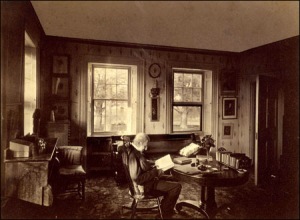Last time James proclaimed “my first act of free will… to believe in free will.” Now we begin to find him acting assertively, though still experimentally, on that belief. Results are panning out well. He’s discovering the power of intention– not Wayne Dyer‘s recent invention– and especially of attention.
As this week’s installment begins in 1874, 32-year old William has just returned from yet another European trip and is sitting down to break bread with the septuagenarian, aphasic, addled Emerson, now clearly in mental decline. The Sage’s large influence on William, as a frequent household presence throughout childhood but more importantly in maturity as philosophical source material, was attested firsthand in William’s remarks at the 1903 Emerson centenary.
Richardson notes as well Emerson’s poetic imprint, as William copied out passages of Emerson’s poem “Give All to Love.” The concluding lines “When half-gods go, The gods arrive” may have struck young James as an invitation to open himself to personal possibilities of growth and creativity he’d not imagined, “gods” signifying goals and ideals rather than transcendent deities. Emerson’s message of individualism and self-reliance would have found eager ears in the young man who’d at last wholeheartedly embraced his own free will and attentive powers.
 James must’ve registered and filed in long-term memory this passage from “The American Scholar,” which he marked in his personal copy: “Action is with the scholar subordinate, but it is essential. Without it he is not yet a man. Without it thought can never ripen into truth.” As noted in a previous post, James’s pragmatic view of truth is that we must unpack the facts and apply them to the actual circumstances of living before we can begin to speak of truth (and falsehood). Truths emerge from facts when we act, not before. Truths don’t come ready-made, pre-packaged, and labeled in advance for our use.
James must’ve registered and filed in long-term memory this passage from “The American Scholar,” which he marked in his personal copy: “Action is with the scholar subordinate, but it is essential. Without it he is not yet a man. Without it thought can never ripen into truth.” As noted in a previous post, James’s pragmatic view of truth is that we must unpack the facts and apply them to the actual circumstances of living before we can begin to speak of truth (and falsehood). Truths emerge from facts when we act, not before. Truths don’t come ready-made, pre-packaged, and labeled in advance for our use.
Another big influence beginning now to impress young James was the utilitarian and libertine John Stuart Mill (“of his own free will,” the Pythons sang), later Pragmatism‘s dedicatee as the philosopher “from whom I first learned the pragmatic openness of mind and whom my fancy likes to picture as our leader were he alive today.”
(“of his own free will,” the Pythons sang), later Pragmatism‘s dedicatee as the philosopher “from whom I first learned the pragmatic openness of mind and whom my fancy likes to picture as our leader were he alive today.”
 (“of his own free will,” the Pythons sang), later Pragmatism‘s dedicatee as the philosopher “from whom I first learned the pragmatic openness of mind and whom my fancy likes to picture as our leader were he alive today.”
(“of his own free will,” the Pythons sang), later Pragmatism‘s dedicatee as the philosopher “from whom I first learned the pragmatic openness of mind and whom my fancy likes to picture as our leader were he alive today.”
During this time James is teaching anatomy and physiology at Harvard, putting his medical degree to use. But he is also beginning to think and write philosophically. He publishes “The Sentiment of Rationality” in 1878, arguing for a concept of rationality marked by “a strong feeling of ease, peace, rest [and] a feeling of the sufficiency of the present moment.” This is not a narrow scientific rationality (though he did not see it, nor do I, as incompatible with scientific values). It is a proposal to regard our happiness as a reasonable aspiration, and reality as potentially “congenial” and cooperative.
Thinking of Pascal’s Wager, he proposes a shift of metaphors: belief is not a gamble, it is a vote. “The decisions we make about how to live are not bets but ballots for a particular kind of world.” The forward-looking meliorist philosopher is starting to surface.
 In May 1877, William (age 35) proposes (again) to Alice Gibbens. She accepts. By the end of the following summer, Alice is pregnant. The conflicted, indecisive, self-berating, noncommittal young man of all those earlier crises is just about gone for good. Life is being built, as he’d forecast, in “doing and creating.” And not, at last, in so much pointless self-absorbed “suffering.”
In May 1877, William (age 35) proposes (again) to Alice Gibbens. She accepts. By the end of the following summer, Alice is pregnant. The conflicted, indecisive, self-berating, noncommittal young man of all those earlier crises is just about gone for good. Life is being built, as he’d forecast, in “doing and creating.” And not, at last, in so much pointless self-absorbed “suffering.”
No comments:
Post a Comment